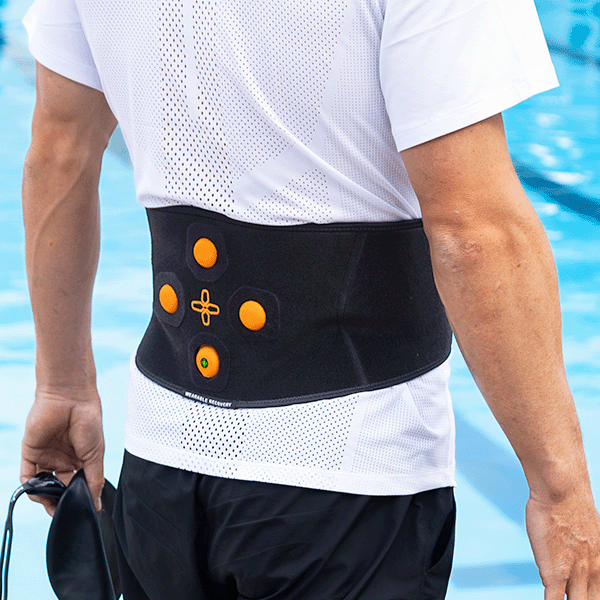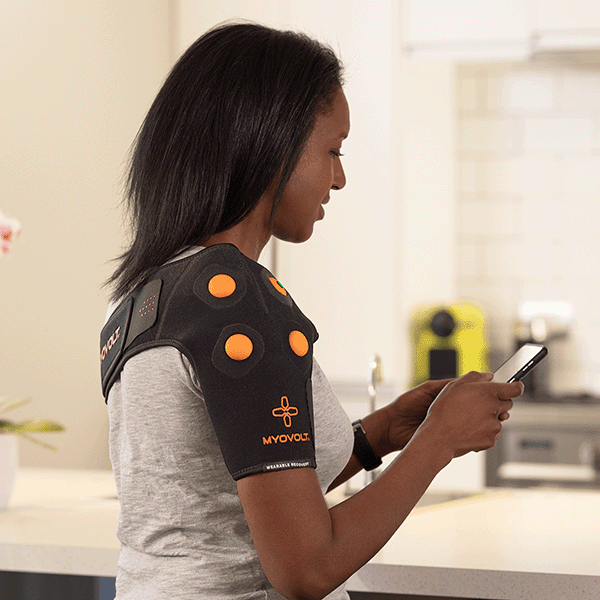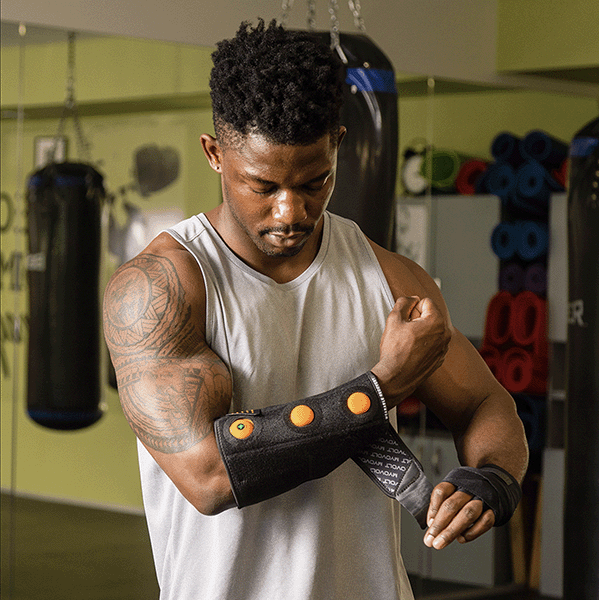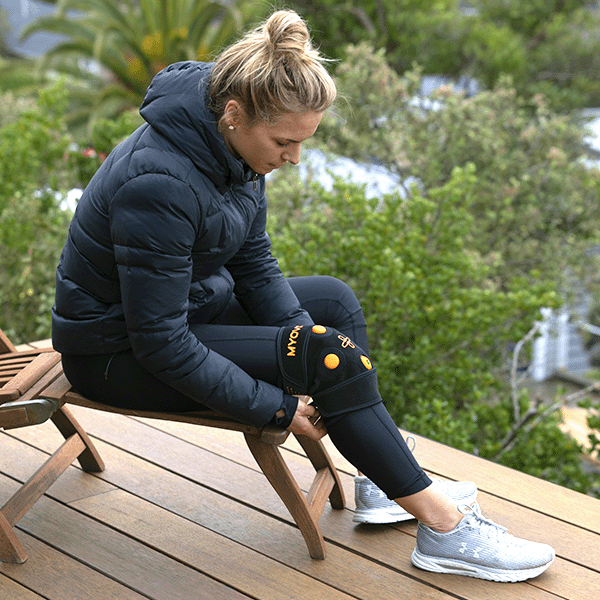The road to the
Tokyo Paralympics.
Cody Everson
NZ Wheel Blacks Captain
Cody Everson training in Christchurch
Earlier this year Myovolt had the opportunity to talk to Cody Everson, Captain of the New Zealand Wheel Blacks Rugby Team about the physical challenges of the sport and the preparations his team were making for the Tokyo Paralympics.
With the Paralympic Games now in full swing, the Wheel Blacks have been placed in a pool with the big teams USA, Great Britain and Canada. With Denmark upsetting the top team Australia in their opening match, so far it's been an explosive beginning.
For those unfamiliar with wheelchair rugby here's a bit of a backgrounder. Wheelchair rugby originated in Winnipeg, Canada in the 1970’s and went by the name ‘Murderball’ due to the aggressive nature of the game. The sport was invented by a group of quadriplegic athletes that wanted an alternative to wheelchair basketball - allowing those with hand and arm function limitations to be able to participate as well. Born from the combination of sports like rugby, basketball and hockey, wheelchair rugby is today played in over 40 countries.
In 2011, Cody Everson, then 15 was playing a game of rugby at school. A tackle during the game resulted in him receiving a serious neck injury which unfortunately left him a tetraplegic. This has not stopped Cody achieving his ambition of being an All Black - he is currently the Captain of the New Zealand Wheel Blacks and in 2019 the team qualified for the Tokyo Paralympics.
“I’ve definitely noticed as I’ve got older the importance of recovery and as I’m training a lot more,
it has become a necessity.”
Q & A - With Cody Everson in Jan 2021
Q: Cody, what got you started with wheelchair rugby and what motivated you to continue with sports after your accident?
A: Within the first two weeks of my accident I had the mindset of ‘I’m gonna walk, I don’t need to know about wheelchair rugby’. So initially I had no interest in the sport, but then I watched the documentary Murderball and my view of the sport changed.
After getting out of the hospital I got to see a group of guys playing wheelchair rugby and I was inspired by how competitive they were. I had a moment where I thought, wow, this could be a sport for me. Knowing then that I wouldn’t be able to play rugby again and finding this new sport gave me a real boost, I knew that it would benefit me in the long run.
Q: What have you enjoyed about wheelchair rugby?
A: I enjoyed learning more about myself and the disabilities of other players. There are so many different disabilities that play wheelchair rugby, we aren’t all the same. It was also seeing that drive in the other players and how they do things even just in everyday life that enabled me to learn so much independence. School wasn’t really working for me at the time, and wheelchair rugby was one of the things I looked forward to. It opened my eyes to the new opportunities I had - like being able to play for the New Zealand team which was awesome.
Q: Besides the Paralympics being postponed, how else has Covid affected the Wheel Blacks team?
A: It has already taken so long to get back to the Paralympics. For a lot of older players in the sport it was also their last chance to play at the Games, so hearing it had been postponed was disappointing. For the Wheel Blacks it was tough at first but now we have this opportunity to potentially get better as New Zealand is one of the younger teams. But none of the team wants to risk getting sick just to get to the Games - as those in wheelchairs are more susceptible.
There are also the quarantine issues - having to quarantine for two weeks on both sides of the trip will be expensive. Each team member will also need a support person to manage the quarantine process so this means we have to find a lot of funding to get there.
Q: What will your training look like in the lead up to the Games?
A: The team's strength and conditioning coach has been sending the team weekly training programs so he has been easing us back into training. I also see another trainer a couple times a week too as I am just getting back into a routine after surgery. I don’t want to rush back into things.
It is going to be a busy year, and for a lot of the guys it’s going to mean a lot of solo training which is tough. But I have found that having a trainer makes my training sessions easier because I can’t just go to a gym and grab a machine, I need a lot of help. I’m able to get more out of my sessions this way.
The road to the Tokyo Paralympics.
Cody Everson
NZ Wheel Blacks Captain
Earlier this year we had the opportunity to talk to Cody Everson, Captain of the New Zealand Wheel Blacks Rugby Team about the physical challenges of the sport and the preparations his team were making for the Tokyo Paralympics.
With the Paralympic Games now in full swing, the Wheel Blacks have been placed in a pool with the big teams USA, Great Britain and Canada. With Denmark upsetting the top team Australia in their opening match, so far it's been an explosive beginning.
For those unfamiliar with Wheelchair Rugby, here's a bit of a backgrounder.
The sport originated in Winnipeg, Canada in the 1970’s and went by the name ‘Murderball’ due to the aggressive nature of the game. The sport was invented by a group of quadriplegic athletes that wanted an alternative to wheelchair basketball - allowing those with hand and arm function limitations to be able to participate as well. Born from the combination of sports like rugby, basketball and hockey, wheelchair rugby is today played in over 40 countries.
In 2011, Cody Everson, then 15 was playing a game of rugby at school. A tackle during the game resulted in him receiving a serious neck injury which unfortunately left him a tetraplegic. This has not stopped Cody achieving his ambition of being an All Black - he is currently the captain of the New Zealand Wheel Blacks and in 2019 the team qualified for the Tokyo Paralympics.
“I’ve definitely noticed as I’ve got older the importance of recovery and as I’m training a lot more, it has become a necessity.”
Q & A - With Cody Everson, Jan 21
Q: Cody, what got you started with wheelchair rugby and what motivated you to continue with sports after your accident?
A: Within the first two weeks of my accident I had the mindset of ‘I’m gonna walk, I don’t need to know about wheelchair rugby’. So initially I had no interest in the sport, but then I watched the documentary Murderball and my view of the sport changed.
After getting out of the hospital I got to see a group of guys playing wheelchair rugby and I was inspired by how competitive they were. I had a moment where I thought, wow, this could be a sport for me. Knowing then that I wouldn’t be able to play rugby again and finding this new sport gave me a real boost, I knew that it would benefit me in the long run.
Q: What have you enjoyed about wheelchair rugby?
A: I enjoyed learning more about myself and the disabilities of other players. There are so many different disabilities that play wheelchair rugby, we aren’t all the same. It was also seeing that drive in the other players and how they do things even just in everyday life that enabled me to learn so much independence. School wasn’t really working for me at the time, and wheelchair rugby was one of the things I looked forward to. It opened my eyes to the new opportunities I had - like being able to play for the New Zealand team which was awesome.
Cody Everson training in Christchurch.
Q: Besides the Paralympics being postponed, how else has Covid affected the Wheel Blacks team?
A: It has already taken so long to get back to the Paralympics. For a lot of older players in the sport it was also their last chance to play at the Games, so hearing it had been postponed was disappointing. For the Wheel Blacks it was tough at first but now we have this opportunity to potentially get better as New Zealand is one of the younger teams. But none of the team wants to risk getting sick just to get to the Games - as those in wheelchairs are more susceptible.
There are also the quarantine issues - having to quarantine for two weeks on both sides of the trip will be expensive. Each team member will also need a support person to manage the quarantine process so this means we have to find a lot of funding to get there.
Q: What will your training look like in the lead up to the Games?
A: The team's strength and conditioning coach has been sending the team weekly training programs so he has been easing us back into training. I also see another trainer a couple times a week too as I am just getting back into a routine after surgery. I don’t want to rush back into things.
It is going to be a busy year, and for a lot of the guys it’s going to mean a lot of solo training which is tough. But I have found that having a trainer makes my training sessions easier because I can’t just go to a gym and grab a machine, I need a lot of help. I’m able to get more out of my sessions this way.
“Right now recovery is a challenge, I still need to do a lot more of it but it needs to be really simple.”
“Right now recovery is a challenge, I still need to do a lot more of it but it needs to be really simple.”
Q: Is muscle recovery a part of your regular workout routine?
A: It is and it isn’t, even though I use my arms for everything. At games we don’t get recovery time for our arms because as soon as we finish in our rugby chairs we go straight to our day chairs and we are back to pushing again.
When we are away at a tournament we play a game in the morning and one in the afternoon with games lasting about an hour and a half. Sometimes we are even playing games back to back and recovery doesn't happen at all. For the Wheel Blacks we do make the effort to warm up and cool down around games.
I’ve definitely noticed as I’ve got older the importance of recovery and as I’m training a lot more, it has become a necessity.
Q: How do you incorporate muscle recovery into your routine?
A: Right now recovery is a challenge, I still need to do a lot more of it but it needs to be really simple. A lot of us that play wheelchair rugby don’t have much hand function - so connecting up an ice pack or using recovery tools can be difficult sometimes. So it’s a case of - if it’s too hard I’m not going to do it.
For me it’s trying to make sure I have a good routine for recovery that I make a habit of. So before I start training I use the Myovolt kit as a warm up for shoulder and arms, as well as having it ready following a training session for recovery. It’s important for me to take some extra steps to warm myself up and make the habit of post-exercise recovery for the long-term benefits.
Thanks for taking the time to have a chat with us Cody, all the best for the Paralympics and we will be keeping an eye out for you on the television!
Featured in this story
Myovolt Arm eases tension and relieve overuse strain in the wrist, forearm and elbow, and delivers a 10 minute focal vibration treatment at the press of a switch. The neoprene arm brace has adjustable fit ...
Q: Is muscle recovery a part of your regular workout routine?
A: It is and it isn’t, even though I use my arms for everything. At games we don’t get recovery time for our arms because as soon as we finish in our rugby chairs we go straight to our day chairs and we are back to pushing again.
When we are away at a tournament we play a game in the morning and one in the afternoon with games lasting about an hour and a half. Sometimes we are even playing games back to back and recovery doesn't happen at all. For the Wheel Blacks we do make the effort to warm up and cool down around games.
I’ve definitely noticed as I’ve got older the importance of recovery and as I’m training a lot more, it has become a necessity.
Q: How do you incorporate muscle recovery into your routine?
A: Right now recovery is a challenge, I still need to do a lot more of it but it needs to be really simple. A lot of us that play wheelchair rugby don’t have much hand function - so connecting up an ice pack or using recovery tools can be difficult sometimes. So it’s a case of - if it’s too hard I’m not going to do it.
For me it’s trying to make sure I have a good routine for recovery that I make a habit of. So before I start training I use Myovolt as a warm up for shoulder and arms, as well as having it ready following a training session for recovery. It’s important for me to take some extra steps to warm myself up and make the habit of post-exercise recovery for the long-term benefits.
Thanks for taking the time to have a chat with us Cody, all the best for the Paralympics and we will be keeping an eye out for you on the television!
Featured in story
Myovolt Arm eases tension and relieve overuse strain in the wrist, forearm and elbow, and delivers a 10 minute focal vibration treatment at the press of a switch. The neoprene arm brace has adjustable fit ...



